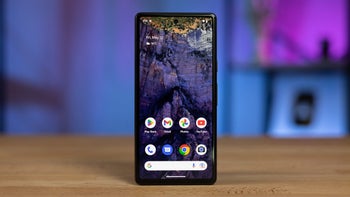Verizon Wireless anounces expansion of 3G network and new pricing plans
Verizon Wireless today jump-started the high-speed wireless data marketplace and staked claim to high-use enterprise business customers by announcing a landmark "all-you-can eat" flat-rate calling plan for unlimited Express Networksm connectivity and use.
Verizon Wireless also announced the Tuesday, May 21, availability of its 1X Express Network in 29 additional markets coast to coast, expanding upon its already extensive footprint and creating the country's first and only national high-speed wireless data network. The Express Network expansion wave now allows for millions of Americans across the country to access the most expansive and robust high-speed wireless data network available. Extending its commanding lead in the high-speed wireless data arena, Verizon Wireless has the first national high-speed data network, reaching more people than any other wireless service provider in the United States.
Denny Strigl, president and CEO of Verizon Wireless, said, "Verizon Wireless has built and defined the high-speed wireless data marketplace in the U.S., and given our aggressive Express Network rollout to key markets, it is the right moment to leverage our national service to offer flat-rate pricing for this service. The Verizon Wireless strategy of building world-class wireless networks, then offering customer value, will stimulate demand and drive penetration of high-speed data services. Tuesday's significant market launches and our clear pricing advantage combine to make the Verizon Wireless Express Network the only good choice for high-speed wireless data service."
John Stratton, vice president and chief marketing officer of Verizon Wireless, said, "Verizon Wireless is defining the enterprise market for high-speed wireless data services. Based on feedback from current, new and potential customers, we know we are providing value to the enterprise and we will continue to leverage our time-to-market advantage to capture more market share in the business market."
Beginning Tuesday, May 21, the Express Network is available to customers in Southern California including the five-county Greater Los Angeles Area, as well as San Diego and Imperial Counties; in the Kansas City and Overland Park area - west to Wichita and east to Topeka and suburban Missouri; Milwaukee's metro area; Vermont's three largest cities: Burlington, Waterbury and Montpelier; additional Texas markets including: Austin, San Antonio, Corpus Christi, McAllen and Brownsville; Orlando and its surrounding areas up to Lake Mary and down to Kissimmee; several locations throughout Ohio including: Columbus, Akron, Toledo and Cleveland; major markets surrounding Detroit, Michigan including Lansing and Ann Arbor; as well as the upstate New York region including the state capital, Albany.
Verizon Wireless Express Network customers can expect average data transmission speeds between 40 and 60 kilobits per second (kbps) with bursts up to 144 kbps - similar to or better than speeds users experience when dialing in from their home PC.
"Some of our competitors have made quick grabs for headlines as they trickle out a few markets with their initial data services," said Stratton. "Others offer traveling vans with displays of services they hope to offer in the future. Today, we invite those business and individual customers who are anxious to increase productivity with high-speed wireless Internet access to stop by their local Verizon Wireless store and learn first-hand what you can do today with our Express Network."
New Pricing Plans
Verizon Wireless today also announced a new, affordable calling plan for Express Network customers. Beginning in June, data-hungry customers can download unlimited data on the Express Network for a flat rate of just $99.99 monthly access with some restrictions. Customers can sign up for one of two types of plans. Time-based usage plans begin at $35 monthly access for 150 minutes of connection, which may be used for either voice or data calls, up to $55 and $75 monthly access that include 400 and 600 minutes respectively. For enterprise customers, Verizon Wireless offers pricing based on megabyte usage for heavy data users with rate plans starting at $35 monthly access for 10 MB, $55 monthly access for 20 MB, and $75 monthly access for 40 MB of data sent and received. Both price plans culminate at $99.99.
Equipment Choices
Business and individual Express Network customers can choose the right equipment that best suits their needs. The Verizon Wireless 2235 handset from Kyocera, the VX1 by LG and the 9155-GPX from Audiovox, are each compact wireless phone options with varied pricing and features. These wireless phones function as a modem and when used with a compatible Mobile Office connectivity kit, sold separately, and laptop, to access the Express Network. The latest all-in-one device that enables consumers to use the same device to make voice calls, access the Express Network or Mobile Web is the Thera-the newest Windows Powered Pocket PC, by Audiovox, which is also a dual-band wireless phone. Thera is a powerful mobile computing device that can access data on several platforms. For customers who value the form factor of a PC card, the AirCard 555 from Sierra Wireless can be used with laptops and select PDAs.
Express Network Service Area
The Verizon Wireless Express Network -only national high-speed wireless Internet access service - is available to customers in the following areas: ·
The Eastern seaboard, including other major Northeast regions: Norfolk, VA to Washington, DC, Baltimore, Philadelphia and Pittsburgh, New York, now including Albany, Buffalo and Rochester, through to Boston in Portland, Maine; and Vermont's three largest cities: Burlington, Waterbury and Montpelier
Midwest: Chicago, St. Louis and Gary, Indiana; several locations throughout Ohio including: Columbus, Akron, Toledo and Cleveland; in the greater Kansas City area, including Overland Park, Topeka and St. Joseph, Missouri, and in Wichita; major markets in and around Detroit, Michigan including Lansing and Ann Arbor and Milwaukee's metro area
Major Texas markets: Dallas, Fort Worth, Houston, Austin, San Antonio, Corpus Christi, McAllen and Brownsville
The east and west coasts of Florida: Miami, Ft. Lauderdale, Boca Raton, West Palm Beach, Lakeland, Tampa/St. Petersburg, Key West and the greater Orlando area
West: in the technology-savvy Silicon Valley and San Francisco Bay Area of Northern California; Salt Lake City, Utah; in Portland, Oregon; throughout all of Southern California, including the cities of Los Angeles, San Bernardino, San Diego and Palm Springs.









Things that are NOT allowed: